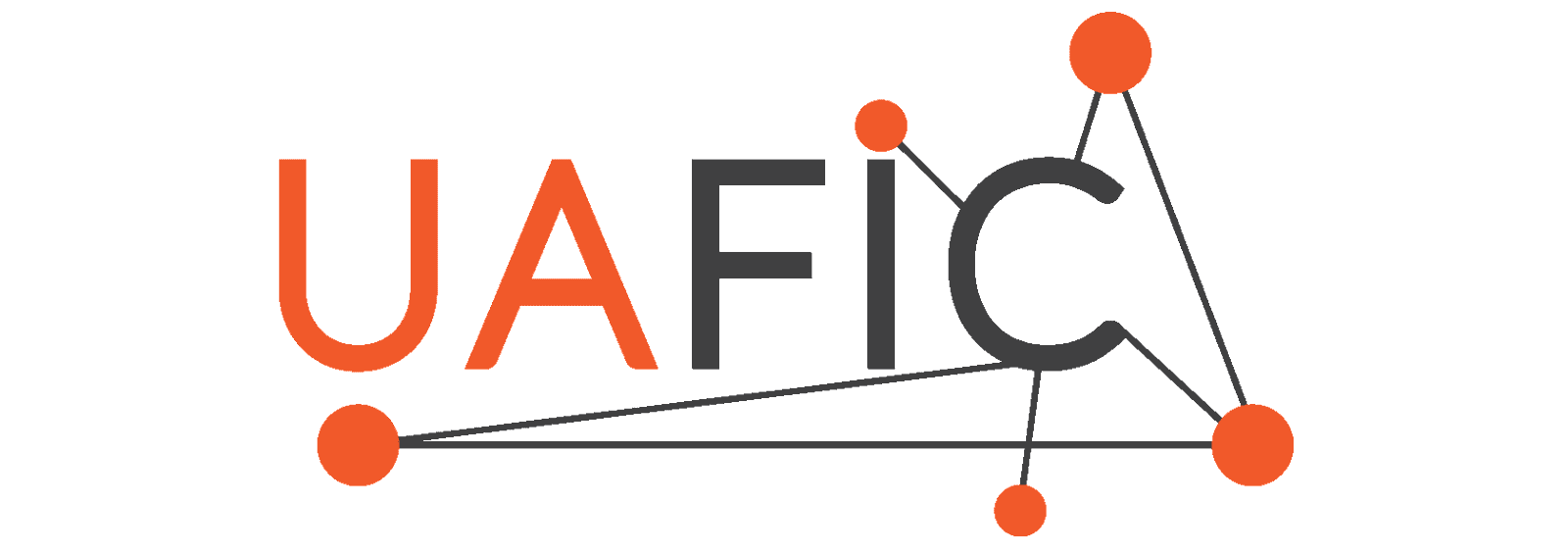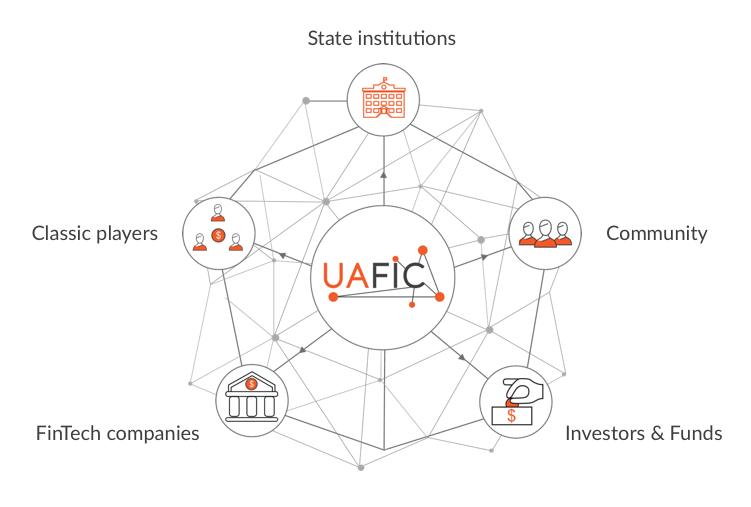‘Doing the right things’ – Ukrainian Fintech

As if to leave no doubt, the chairman of the Ukrainian Fintech Association is wearing a black hoodie with large white text across the front: I’M UKRAINIAN. Rostyslav Dyuk displays pride in his country, and the fact that his NGO is doing well, despite the enormous struggles in over a year of war. The association was founded in 2018 and is currently on a mission to Research, Advocate, Collaborate, and Educate, of which more presently.
But first some background about Fintech in Ukraine, or more correctly, the banking sector, as prior to 2014 there wasn’t much going on as far as Fintech was concerned. At that point the National Bank made the decision to have a cleanup of a very crowded banking market, with over 200 banks being reduced to less than 100 – which came as something of a shock for many customers, and the bankers themselves.
As Rostyslav describes the situation between 2008 and the cleanup, even the smallest township would have five or six different bank branches, with people using one for a car loan, another for a cash loan, and so on. Coupled with generally low financial literacy, and the saturation of the banking market, change was overdue. Rostyslav is critical of the lack of financial literacy in the past, and the fact that it wasn’t a subject touched on in school, or even universities. I guess that’s now part of the Education remit of the Fintech Association.

‘Nobody understood, nobody believed…’
And then, almost overnight, people walking down their highstreet looking for various bank loans found that half the branches had disappeared. Where were all those normal branches to solve normal problems? This was at a time when cash was very definitely king, and around 70% of the population were excluded from the broader financial sector. “Corruption likes cash,” Rostyslav also notes, and the National Bank needed to combat shady financial practices, as well as making moves towards much greater financial inclusion, to bring in that missing 70%. The time was right for a more cashless economy, with the initiative supported by the Ministry of Finance, and donor organizations from outside Ukraine. Some of the more enterprising bankers began to leave the relative safety of their day jobs, with the idea of creating Fintechs to service the new reality, and Rostyslav can pinpoint these startups as happening in 2016: “We had the perfect growth conditions because nobody understood it, and nobody believed in the segment!”
Enter the Fintechs
Big surprise – these new entrepreneurs were digital savvy and rapidly began to provide a superior service to the old banking system. The Fintech boom went hand in hand with a big boost of internet services. Prior to 2018, average internet coverage across Ukraine was at 70%, although in rural areas the figure was much lower. Then smartphone use exploded, with “i-phones for people with money, and cheap Chinese copies for everyone else.” The love affair with Big Tech began, in the form of Google, Amazon and Facebook (or in other words, the usual suspects). That meant the advent of what was already becoming a global tendency of people expecting online services to be smooth and easy to use. Meanwhile the Ukrainian financial market was fragmented between old Soviet-era practices, with “Either no regulation, or just stupid laws,” the new world of digitalization, and a regulator looking more to Europe than to the east.
Into this melting pot came the strand of Ukraine’s largest private bank – Privat Bank – which was in trouble by 2018, with a scandal which ultimately led to the government nationalizing the company. Privat Bank had a large network of branches, and over half the population of Ukraine as customers, so it was in the ‘too big to fail’ category. As Rostyslav recounts, all of these different vectors were pointing towards the arrival of Fintechs. But where was he at the time? Well, he’d clocked up around 14 years experience in banking, working as a Deputy CEO of a bank. Responsibilities included risk management and digitalization, and looking into bluesky matters such as the cashless economy and financial inclusion. Deciding that it wasn’t necessary, “To reinvent the bicycle,” Rostyslav started on a round of investigation into how things were done in other countries, traveling the globe in search of best practices and great ideas. And what did he find? “I found that everywhere around the world, the bridges to financial inclusion and a cashless economy were built by Fintechs. Fintechs brought in digital finance, and Fintechs bootstrapped the cashless economy.”

Small and silo-ed… at first
By now there were Fintech startups happening in Ukraine, and Rostyslav reached out to the 100 or so that were already in existence. He characterizes them as working in small segments, not very publicly, and not at all active in the PR arena. What’s more, he was typically told by these new companies that they didn’t need any assistance. It seemed they wanted to stay relatively low profile, not least because they were wary of potential disputes with the National Bank. There was very little regulation related to how Fintechs might function, which in some respects was preferable to having to argue with the Regulator, and losing.
So, a bunch of small and silo-ed emergent Fintechs, wanting to attract attention in the market, but afraid of being caught on the Regulator’s radar, and keen to tell their story, but lacking the experience of how to achieve that. Rostyslav also observed that these startups could work far more effectively if instead of being small-time competitors, they presented a united front. “So I made a decision, and stepped back from my job. In 2018 we established from scratch the Ukrainian Association of Fintech and Innovation Companies, and from the start we had a 20 year strategy to deal with the huge lack of legislation, and the huge lack of technology implementation.” There was a lot of asymmetry to address, for example, “To use some technologies, we needed to have new special laws allowing the use of the Cloud, or Remote Identification, or Blockchain, or whatever.” Fintechs were being restricted by inappropriate legislation, or simply the lack of legislation. “So we started pushing at this…”
But before we hear more, let’s drop in on Andrii Kryvoshapko, CEO of NovaPay.
Planning for the worst
Andrii is not about to ignore the obvious fact of the Russian invasion of Ukraine, and is keen to remind me that the war did not truly begin on 24 February 2022, but actually in February 2014 with the invasion and subsequent annexation of Crimea. “That is in the east of Ukraine,” Andrii explains, “And a lot of people in the capital and elsewhere were thinking about how to deal with the threat in the future.” The company he leads, NovaPay, and the whole group of companies Nova Post were no exception, and in the pre-war year, prepared an anti-crisis plan, which everyone hoped would not be needed. So, due to the scale and number of territories that were attacked at the same time at the beginning of the war, the main areas on which the company concentrated were providing payments, uninterrupted operation of the IT system, and communication with the network, and the team in general. “We lost a lot of cash from our branches throughout Ukraine, and all of the equipment was looted from many of them,” Andrii adds.

Learning to adapt
Let’s roll back some time though, and clarify the relationship between Nova Post and NovaPay. Nova Post started out as a delivery company, couriering parcels initially in Ukraine, and later throughout the world. NovаPay was then started as a servicing company for Nova Post, to cover financial transactions between businesses and individual customers. It was an inevitable consequence of needing to work in a licensed way, at scale.
Eventually it became clear that NovaPay had to think about developing its business model to suit the modern world, and not get stuck in “the classical banking way of doing business.” Therefore, in the early 2010s, a financial company with services for individual and business clients was developed. At the same time, Andrii and his colleagues were conscious of the rate of change in the world, and the need to consider the opportunities provided. “We had to adapt back then, and now we’re having to do that every day.” During recent months he has also been following the old advice to ‘hire people who are smarter than you are’ and bringing new energy to the company: “More people, more diversity, more energy to look beyond.”
The economic home front
I had imagined that since the invasion, companies are merely clinging on to existence, so to hear Andrii talking up the future comes as something of a surprise. He describes creating an ‘economic rear’ in the war, and the need to support employees and citizens during incredibly difficult times. As a result, things have been far from static, and many of the company’s processes have been streamlined and speeded up in over a year of war. Expansion into Europe was already being discussed in 2020 as NovaPay explored markets and gathered statistics. The team were also looking at the cultures they might engage with, and how some parts of Europe differ from the Ukrainian mindset.
In the short term, cultural differences won’t be to the fore either as it’s likely NovaPay will be concentrating on the Ukrainian diaspora, now spread across the continent (but with a particular concentration in Poland). Andrii sees it as a part ‘social mission’ to open the same Nova Post and NovaPay branches with the same experience and brand, to help people understand that even though they are stranded abroad, they have not lost touch with their homeland and have a Europe-Ukraine connection.
Put another way, NovaPay provides a lifeline for funds traveling between families who are separated, and companies that need to keep their cash flow moving. Now, there are Nova Post branches in Poland and Lithuania, and other countries in the region are likely to follow. NovaPay is not far behind in the logistics business – the company has opened an office in Vilnius and submitted documents to the Central Bank of Lithuania for an EMI (Electronic Money Institution) license.

Keeping on going…
The basic services offered by NovaPay haven’t changed, but some things have altered, such as making it easier for citizens to collect cash from expanded Nova Post branch services in Ukraine, and the launch of new products which take account of customer needs. There are also frequent problems to deal with – far beyond the experience of most of us – with the electricity infrastructure being bombed out frequently, or other acts of war that constantly impact day to day life. Before the invasion, Andrii says that NovaPay counted around 10 million customers in their system in Ukraine. He points out that there are now more than 8 million people outside the country, according to the United Nations, with over 4.5 million having Refugee status. . Meanwhile around 10% of the eligible male population are serving in the army
So as well as the work of supporting citizens in Ukraine and abroad, plus aid for the army, the company continues to provide jobs and financial services for Ukrainians. Nova Post and NovaPay have worked every day of the war – both on the front line and in the back office. Front line workers – operators and cashiers, loaders, and couriers – are still at work every day in branches, terminals, and sorting centers. Back office specialists also continue their work in offices in Kyiv, Poltava, and other cities, and some remotely.
… And staying connected
Not for the first time in talking to Ukrainians, I find my jaw dropping at the horrors the country is going through, and also at the astonishing resilience and fortitude of people. There seems to be a ‘never say die’ attitude which is widespread in the population in general, and in businesses.
And speaking of fortitude, it’s with a wry smile that I note the clean-looking, brightly lit office that Rostyslav Dyuk is speaking to me from. So the electrical infrastructure is still functioning in his part of Kyiv? Well, yes and no: he’s next to a railway station where power can be borrowed. I imagine (probably wrongly) cables trailing from the office window down to the train lines. There’s also stable internet, from Starlink? But no, Rostyslav says that Starlink can be unreliable on cloudy or snowy days, so the Fintech Association makes welcome use of an optic fiber connection.
As with Andrii Kryvoshapko, I get the impression that Rostyslav is very much engaged in the conflict, and he tells me about a conference the previous week where the main topic was, ‘We truly believe we can win this war.’ He says that the Association supports the army, but “We can’t speak of all the things we are doing at the moment. Maybe after the war we can say more.”
The plus side
Paradoxically there are some things coming out of the war which Rostyslav sees as being of benefit in the longer term. One is that digital finance has been firmly proven, with massive use by the populace, without the need for an expensive physical infrastructure. When peace comes, digital finance will be entrenched in the lives of everyone.
He also sees increasing strength in the SME economy using digitalization as platforms for connection and communication. Remember that it’s less than ten years since the first Fintech green shoots started appearing, and now it seems that the whole of Ukraine is on the digital highway.
A third future driver that he predicts is the implementation of open banking, taking the financial sector and the economy overall to a whole other level. It’s happened in many other countries, and he’s confident it will take off in Ukraine.
Lastly there’s the issue of trust, and the need for increased corporate governance in the financial sector, both banking and non-banking. To this end the Fintech Association is in close contact with government, and reform is on its way.

Trust, the main asset
“Trust is the main asset in financial sectors,” Rostyslav believes, which is why the Fintech Association has worked to set up FinSkarga, the only platform in Ukraine providing the opportunity for anyone to raise, and settle issues with financial institutions. To date over 7,000 individuals have been helped to make effective complaints, through the arbitration of the National Bank. Rostyslav refers back to the lack of financial literacy among the mass of Ukrainians, and how necessary it was to build a clear, trustworthy method of dealing with financial problems.
Another forward looking initiative is the investment in ‘human capital’, which will be in even greater demand after the war is over. The Association visits universities and builds alternative points of education about Fintech. There are already five major universities allied to the program, each with a Fintech Lab. Each student gets their ‘first practical touch of Fintech’ and may also be helped to their first job in the industry.
The flow of talent
Thinking of that job scene of the future, I wonder how badly affected the Fintech scene is in terms of losing talent, both to the war effort, and from the draining away of skilled people to other countries. It’s a problem for the future Rostyslav admits, and one that the Association is very aware of. How will these young and talented people be tempted back to a country which will require such huge restoration, when they have settled into comfortable, well-paid jobs abroad? Even here though, there’s a silver lining to the cloud, in that Fintech Ukraine works closely with the European Digital Finance Association, and foresees the time when there will be complete compliance with the European legal framework. That means European companies and startups will be beating a path into Ukraine, with new ideas and more products, therefore creating a much larger ecosystem with well-paid jobs. At which point the tidal flow will likely reverse, and along with the new European talents, there will be a return of European-ized Ukrainians. “And of course,” – Rostyslav seems to be one of those people who can always spot the win-win – “All this new competition will benefit Ukrainian consumers.”
Rostyslav, by the way, is one of those many people mentioned by Andrii Kryvoshapko as living a life separated from their families by the war. The Dyuk family are sheltering safely in the UK for the war’s duration, after missiles hit a home very near theirs. Rostyslav however stayed because, “I need to support my country.” Meanwhile his children are attending school in England, which his son says is the best place in the world because they play football every day!
NovaPay activity streams
Like Rostyslav, Andrii is looking to the future and is pursuing several major activity streams. The first is to improve NovaPay services in Ukraine, including launching a mobile application and expanding the network of owned terminals in branches, based on the already existing 9,000 Nova Post branches. This will increase the speed of services and reduce transaction costs. The company also expects to receive an extended license from the National Bank of Ukraine, which will allow the creation of accounts for private clients, and the issuing cards for greater convenience.
For businesses, NovaPay intends to expand the range of services for ecommerce enterprises. NovaPay is a principal member of Visa and Mastercard, becoming the fourth such company among the CIS countries and the second in Ukraine (the first was state-owned). This means that NovaPay has all the capabilities to process ecom transactions.
The second activity stream is the development into Europe. The EMI license, which is expected to be obtained in 2023, will allow NovaPay to provide high quality financial services to private and business clients – both Ukrainians in the EU and European citizens.

Ukrainian unbreakability
That’s the more strategic and techy stuff, but there’s also a lot of continuing day to day services such as payments for utilities or mobile service, and card top ups – getting the basics right and keeping them right. This includes partnerships with Western Union and Ria for international money transfers, plus new initiatives in ecommerce connections to large retailers. Essentially however this stream is ‘business as usual’.
Then there are the international markets that NovaPay is continuing to study, which are challenging in terms of Ukrainian cultural business habits, because it can’t be just copy paste of European ways of doing things.
The resilience and ability of the company’s team to rebuild has allowed them to develop further, and open new markets during the war, to serve the needs of Ukrainians abroad. That would be a challenging task in peacetime, but with stretched resources and low staffing, it seems quite an achievement.
The Diia effect
A significant backbone service available to banking and Fintech in Ukraine came with the launch of Diia in October 2020. ‘Diia’ means ‘Action’ in Ukrainian, but is also a clever play on an acronym for ‘The State and Me’. It’s a web service, mobile app and e-governance app which is now in wide use in the country, and is trusted by citizens and businesses alike. Diia is a government portal which enables the use of digital documents for ID and sharing purposes, with the result that the uptake and trust in the system is widespread. Within the first year of rollout, Diia was being used by 6 million Ukrainians, with over 50 government services being accessible. By December 2022 there were more than 20 million users, and government services had jumped to 70, including issuing of ID cards, foreign biometric passports, student cards, driver’s licenses, vehicle registration certificates, vehicle insurance policies, tax numbers, and birth certificates. For Fintechs and banks looking to onboard or verify customers, Diia has become the go-to.
I ask Andrii about the uptake of voice for banking and verification, but he comments that as yet the culture for biometrics has some way to go. There are experiments in facial ID and voice use, but he reports that in general Ukrainians are a little suspicious of their data being accessed in this way, despite the success of Diia.
Nevertheless, Andrii notes how far and fast Ukrainians have gone in migrating to digital channels, and that now ‘even very old people’ who are keen on traditional forms of financial services are engaging with web platforms, cameras, and recordings. “That’s been a kind of educational mission, which NovaPay supports as much as possible. And at the moment, Ukraine is one of the most digitalized countries in terms of financial services.”
It seems that Diia, and the knock-on effects of widespread digitalization came about just in time, given that the population needed to get to grips with technology, and that the invasion was not far behind. In part that came from positive educational initiatives, which makes me wonder about the activities of the Fintech Association.
Preparing for the unbelievable
We’ve already heard about partnering with universities and the creation of Fintech labs, but before talking more about the Association’s goals, Rostyslav Dyuk first wants to recap on the immediate effects of the outbreak of war. “You can never be prepared for war. The banks lost up to 30% of their physical infrastructure: terminals, ATMs, branches, and 15% of customers became refugees.” In this situation, Fintechs were able to give significant help to the banks, and attitudes rapidly began to change: Rather than seeing Fintechs as competitors, the idea of partnership in innovation started to grow. “Before, banks couldn’t innovate because they had to work through a very formalized process. If you broke the process, there would be a penalty from the National Bank, because you could only innovate in a specific structure. Now however we’re pushing the National Bank to build a sandbox to test new products, to work with creative ideas, new products and technology.” In other words, like many other western countries, the National Bank is being patiently nudged along by a dedicated Fintech Association. That’s the ‘A’ for the Advocate part of the ‘RACE’ mission mentioned at the start, which includes lobbying for Open Banking legislation and new payment laws. These will help Ukrainian businesses go global more quickly, in part by harmonization with European regulation.
Education, and more education
We’ve already touched on the ‘E’ of Education, to bring forward the next generation of talent. Education also includes spreading the Fintech message through conferences and meetups, and partnering with organizations such Crédit Agricole, Raiffeisen Bank, as well as other Fintech associations, including in Japan and Bulgaria. Rostyslav is also pleased to say that the often under-reported topic of Women in Fintech is receiving attention from the Association. This comes in the form of special panels at meetups and conferences, and also the Top-50 Women in Fintech list: ‘Some women control world-renowned companies, others have a fresh perspective and projects that can change the business industry. Who are they?’ It’s no criticism of Rostyslav’s Association, and probably a fair picture of Fintech in general that of the 15 Jurors deciding who those top 50 women are… Only 2 are women. Nevertheless, the Association is working to actively promote better gender balance.

A definitive snapshot
And the ‘R’ and ‘C’ parts of the mission?
Research is key to the Association’s goals, to analyze financial innovations and facilitate market development. Each year the Ukrainian Fintech Catalog is published, to show the findings of research into the number of companies, their activities, and their market value. The Catalog comes in Ukrainian and English, giving industry statistics resulting from surveys, also sourced from the National Bank, World Bank, and Ministry of Finance, among others. In other words, it’s a pretty definitive snapshot. “We need to tell the truth to global investors and global partners,” Rostyslav says. He adds that although the catalog is dual language, around the globe the real dual languages of Fintech are English… and Python.
Looking outwards
‘C’ in the RACE Mission is for ‘Collaborate’, and it should already be clear how outward-looking the Association is, from working with other Fintech organizations, Classic players, State institutions, and the domestic banking and Fintech sector. That’s not even to mention the ‘Cyber Resistance’ which Rostyslav cannot detail at present. Of course analytics overlap with conferencing and collaboration, advocacy meshes with education, and it all demonstrates ‘joined up thinking’ that makes the Association, ‘the lodestone of the Ukrainian Fintech ecosystem’.
“So in five years, we have achieved results. For example the first government-built Ukrainian startup fund to give equity free grants for startups. It’s a competition and the winner receives a grant from the government to build their startup. It’s a cool idea, because before this, all international accelerators came to Ukraine, found young startups, gave them 10k euro and took them to Europe, and then they never came back. Now the government gives money and they can build something inside Ukraine. So this is one of the first deliveries we have, and we are proud that we are part of it.”
Again, pride in solid achievements, and an insistence on keeping on keeping on.
The future, and now
Andrii Kryvoshapko is similarly pragmatic about the approach of NovaPay, where he and his team are looking at new solutions for the future which will allow equally effective offline and online working. Now the company is relying on generators in many of the 9,000 branches across the country, and on Starlink. “But we have to be very careful,” he says. “When you’re thinking of changing the model – which we were already considering three years ago – there can be more problems than benefits if it’s not done properly.” So right now discussion topics are mostly around creating a system in which NovaPay and its customers can thrive. “We are among the few players in the market who are dealing with a significant number of SMEs, and big retail clients, so we can create synergy for them through. And of course, our general model is to absorb the best benefits of the neobanks.”
Íaha! So another Revolut, Wise or the Ukrainian Monobank?
Andrii smiles and shakes his head at that, “No! Our ambition is not to create ‘just another neobank’, yet another application for the customer. We need to embed it into our DNA as a part of the Nova Post group of companies, and to maximize the use of our licenses, and our technological capabilities. We want to make something quite unique for the customer.”
And who would argue with that?

Triangulation
Now, in conducting interviews about Fintech over the last few years, I’ve worked on the idea of ‘triangulation’ of ideas and opinions. One person’s experience is interesting. When contrasted with another person’s ideas, the result can be even more interesting. When a third viewpoint is added, then ‘the space in between’ goes some way to mapping out the Flavor of Fintech in a country, or sector. This article was to be no different, and I had the pleasure of also speaking with a senior partner at iBOX Bank who provided insights into the market, and the growth of the company.
When I started arranging interviews in Ukraine, I imagined that the situation would be fragmented, perhaps a little bit like the American Wild West, with a lot of improvisation going on, and maybe some rule-bending to get around problems. As I learned from Rostyslav Dyuk, that’s far from the case, and in fact ‘business as usual’ seems to be the strongest watchword. That’s business as usual as in level-headed plans for now, and ambitions for the future. The National Bank has played a robust part in helping financial institutions through the war – including, for example – allowing the use of Cloud services for the processing and storage of financial data. The National Bank is also ever watchful, which brings me back to my interview with the iBOX executive: I was all set to write up my ‘triangular’ interviews, when I received a notice headlined, ‘the National Bank of Ukraine revokes license of Ibox Bank due to poker tournament, improper financial monitoring.’ Since then, my line of communication has gone quiet and it seems that the bank is under investigation.
However, I do believe that I can paraphrase a non-contentious fragment of the interview, describing the ‘Shock and awe’ of being plunged into war:
A personal recollection
‘From the first hour we understood that we had to keep on working: We have a lot of clients and in this very chaotic time people didn’t understand if they could still use cards. In the first few days some hotels or shops said they would not accept cards because they were afraid there would be problems with the banks. The National Bank of Ukraine stepped in to work directly with the banks and everybody soon understood that the system was still working. But more than 10 million people moved in just a few days and many bank branches were closed, so our terminals became the only way to top up cards.
Our turnover increased dramatically, but we had to make cash collections from our branches while cities were being bombed. It was a very hard and interesting time because all the decisions we needed to make were very new to us. More than 10 million people were on the move in just a few days, and many were afraid that there would be problems with the banks. For a few days, with bank branches closed, our terminals became the only way to top up cards. However in this way the money ran out quickly, so instead of collection, our employees took money from branches that were closed to give cash to people – for example to pay pensioners.’
And after the war – what happens then?
‘I think everybody now understands that Europe is not very far from us. And because of the huge number of people from Ukraine now living in Europe, Ukrainians will establish businesses in Europe. After the war, Ukrainian businesses will be much more international.
Post war rebuilding
Andrii Kryvoshapko foresees many challenges once the war is over, with likely crises in demographic areas and macroeconomics. “In some ways I’m more afraid about that coming period, than I am at this time,” he says. “I can’t think of another country that has faced so many difficulties in the last 50 to 60 years, where all the solutions in the world aren’t exactly suitable to solving our problems.” From the perspective of his company however, he’s more optimistic as he sees the inevitable international expansion as being successful. The mindset of Ukrainians will also change significantly, especially as those in the financial sector have to face new ideas and categories, at a whole different scale. “We’ll be exploring more, and making more experiments.”
The summary from the Chairman of the Board of the Ukrainian Association of Fintech and Innovation Companies, Rostyslav Dyuk, is even more succinct: “We are proud to be Ukrainians, especially in this tough time, and we believe that we are doing the right things.”
recommended
articles
Find out more about the topic




Share your opinion with us